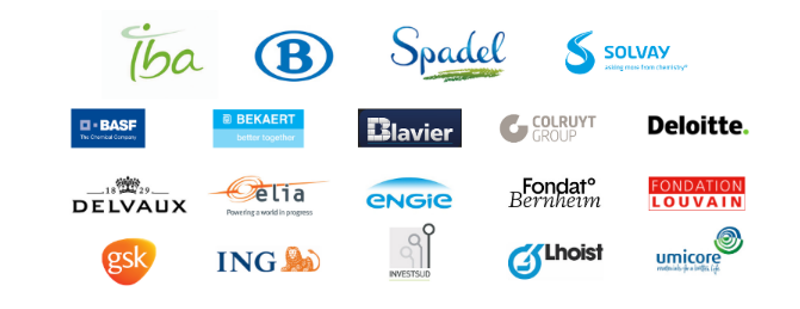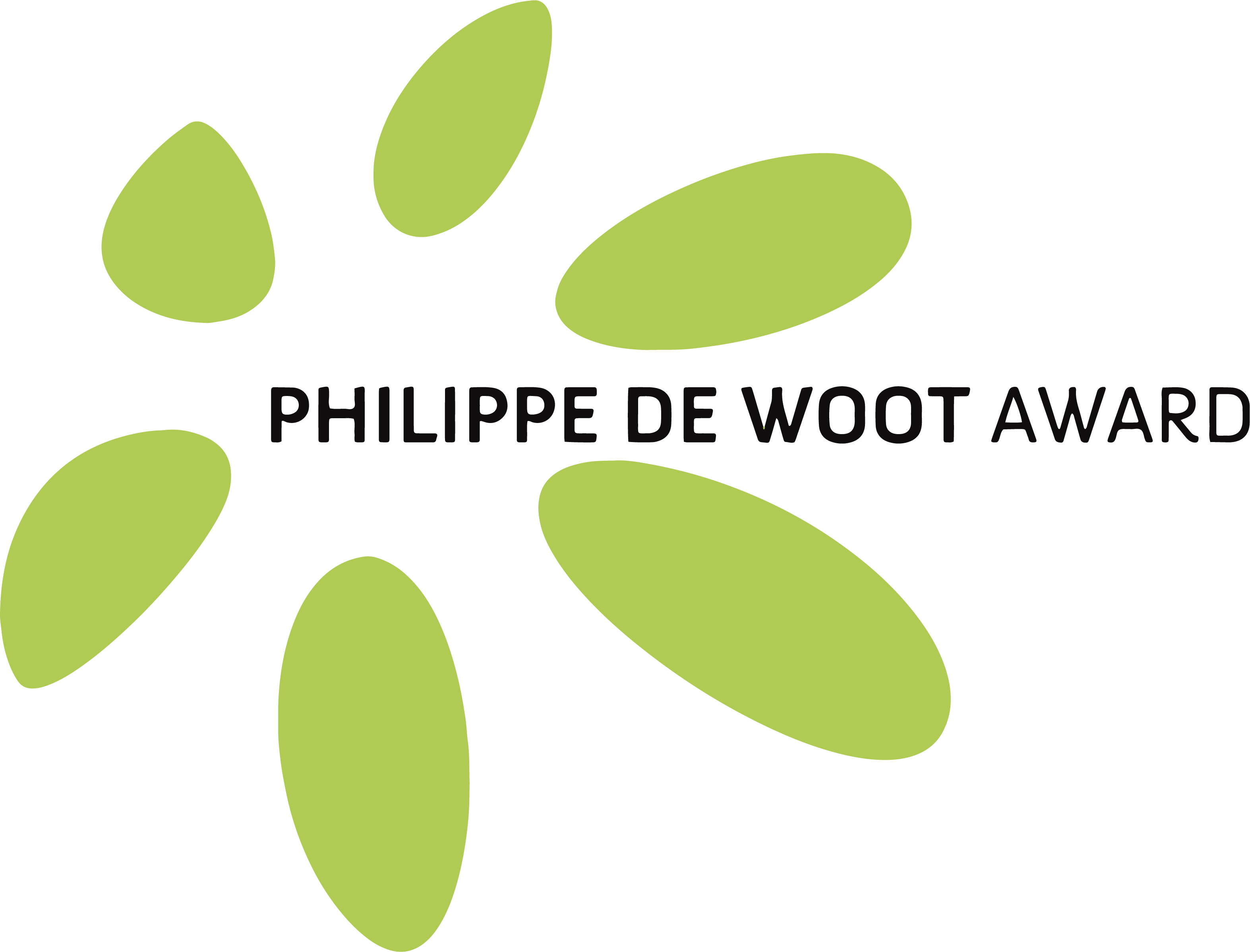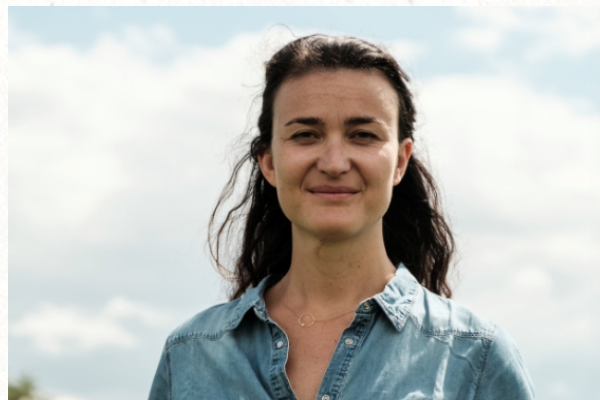The Philippe de Woot Award Ceremony 2022
Results
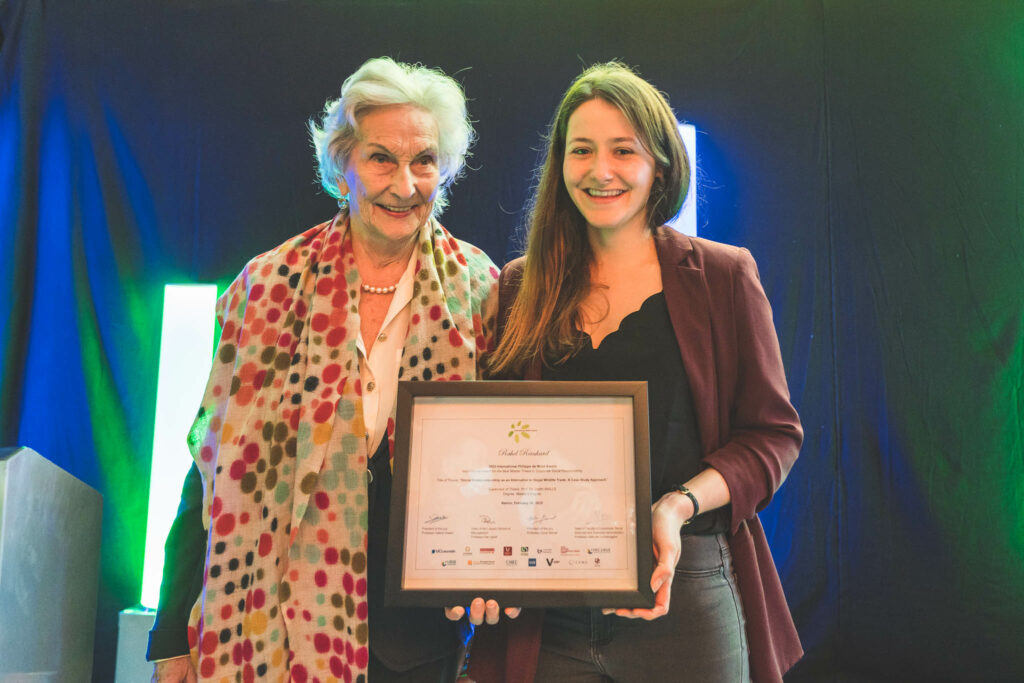
©Skuds – Simon Fusillier
The 7th edition of the Philippe de Woot Award was hosted by the UNamur -the capital-city of Wallonia in French-speaking Belgium- on February 28.
The 2022 Philippe de Woot Award edition was honored to welcome François Marty (Chênelet), Piet Colruyt (Impact) and Clotilde de Montpellier (Farm for Good and UNamur) who shared with enthousiasm their views on social and impact entrepreneurship and investing.
The three shortlisted finalists were Ines Maria GARCIA (UCLouvain, Belgium), Alena KONONENKO (St Petersburg State University, Russia) and Rahel REINHARD (University of St. Gallen, Switzerland).
This year’s Prize was awarded to Rahel REINHARD (University of St. Gallen, Switzerland) with her inspiring master thesis “Social Entrepreneurship as an Alternative to Illegal Wildlife Trade: A Case Study Approach”.
She received a prize of 3000€ of which half goes to different communities with whom she worked during the realization of her master thesis.
If you’ve missed the ceremony, watch the video below!

Organization and nominees
39 master thesises have been submitted from 11 countries. They have been examined in two steps:
- Sophie BEREAU – UNamur & UCLouvain – LSM, Belgium
- Oscar BERNAL – UNamur, Belgium
- Nicolas DENDONCKER – UNamur, Belgium
- Christel DUMAS – ICHEC Brussels Management School, Belgium
- Manal EL ABBOUBI – Université Mohamed 5 Agdal, Morocco
- Perrine FERRAUGE – UMons, Belgium
- Cécile GODFROID – UMons, Belgium
- Julie HERMANS – UCLouvain – LSM, Belgium
- Marek HUDON – ULB Solvay, Belgium
- Amélie JACQUEMIN – UCLouvain – LSM, Belgium
- Frank JANSSEN – UCLouvain – LSM, Belgium
- Céline LOUCHE – Audencia Business School, France
- François MAON – IESEG School of Management, France
- Sybille MERTENS – HEC Liège – ULiège, Belgium
- Paulami MITRA – IESEG School of Management, France
- Lars MORATIS – Antwerp Management School, Belgium
- Sophie PONDEVILLE – UNamur, Belgium
- Valérie SWAEN – LSM – UCLouvain/IESEG Management School, Belgium/France
- Laurent TASKIN – UCLouvain – LSM, Belgium
- Joelle VANHAMME – EDHEC Business School, France
- Wayne VISSER – Antwerp Management School, Belgium
- Jeroen ALTING VAN GEUSAU – SNCB
- Michel BANDE – Solvay
- Thomas CANON – IBA
- Marie D’HUART – CAP conseil
- Eglantine EECKHOUT – The Shift
- Céline MARQUET – SPW
- Lettemieke MULDER – Enactus
- Jan NOTERDAEME – CSR Europe
- Marcello PALAZZI – B Lab
- Marjan VAN DE MAELE – Fondations for Future Generations
- Ann VANDENHENDE – Spadel
- Michel WASHER – Solvay

The nominees & finalists
Among the submissions, the academic jury selected the 5 following nominees. Then, it short listed the 3 finalists.
The three shortlisted finalists were Ines Maria GARCIA (UCLouvain, Belgium), Alena KONONENKO (St Petersburg State University, Russia) and Rahel REINHARD (University of St. Gallen, Switzerland).
To get a better insight about the different projects, the 5 nominees have made a small video to explain and better illustrate their goals:
Understanding the Circular Economy: An Explorative Study in the Swiss Mechanical Watch Industry
Danijela MICIC (University of St. Gallen, Switzerland)
The circular economy (CE) has recently gained significant momentum amongst policymakers, businesses, and academia as a holistic and sustainable alternative to the current linear economic model. This study examines the CE as a concept within the luxury fashion segment, specifically, the Swiss mechanical watch industry (SMWI). Although the luxury sector and the SMWI seem relatively small, for example, in comparison to the fast fashion industry, they still are essential in trendsetting and market influencing. Moreover, the SMWI has the potential to advocate a shift towards a more sustainable future by engaging in the CE. Due to its high visibility and well-established, dominant position in the global luxury market, the SMWI has a higher exposure to reputational risks and plays a crucial leadership role in sustainable development. Overall, the luxury industry has come under increasing pressure to incorporate sustainable practices. Thus, the CE offers an opportunity for the SMWI to rethink its processes and business models to mitigate the environmental and social impacts mainly caused during the extraction of raw materials in its supply chains. By conducting a multiple-case analysis based on ten expert interviews from the institutional field of the SMWI, this study identifies the most prevalent institutional drivers and enablers that facilitate the transition towards CE practices. Moreover, this study establishes a conceptual framework based on the institutional theory as a guiding analytical tool to explain the external driving forces within the sector. Finally, this study shows that predominantly normative pressures and cultural-cognitive pressures, respectively, drive or enable the CE transition, whereas regulative pressure is a weak enabler.
Understanding the use of sustainability information by the financial world: ESG integration process and its influences
Sam VANDEZANDE (Louvain School of Management, UCLouvain – Belgium)
This thesis explores the use of sustainability information, also known as ESG information, by asset management firms. The goal is to bridge the gap between the information reported by companies and the information needed by professional investors. In order to understand this use, I analyze financial institutions’ motivation to integrate ESG information, their ESG strategies as well as their use of ESG content and sources during the various phases of the investment decision process. Finally, I develop the factors that influence the integration of ESG into this investment decision process and propose an associated model. More particularly, this thesis examines two recent developments on the financial landscape, the Covid-19 pandemic and the European taxonomy.
Green bonds issuance as a way of long-term value creation
Alena KONONENKO (St. Petersburg State University – Russia)
The goal of the research is to evaluate the effect that green bonds issuance has on a company’s long-term performance. To find the potential effect, first a link between companies’ price to book ratio and long-term performance was proposed after an analysis of previous academic sources. Then, DID estimation has been used for the evaluation of different sectors of business. Data included time-series price to book values for companies from years 2012-2021. DID findings confirm that for energy sector, there is a significant negative effect of green bonds issuance on price to book value, while for technology sector, the effect is positive. For other sectors, the effect is not significantly different from zero.
Applying a lens of practice theory, how ownership and hygiene impact the adherence of subscribing to a sustainable functional economy in the clothing industry?
Ines Maria GARCIA (Louvain School of Management, UCLouvain – Belgium)
The clothing industry is following a linear business model that generates negative impacts, mostly towards the environment and the people involved. Hence, there is an urgent need to shift from this polluting business model to a regenerative economy. The sustainable functional economy seems to be an adequate alternative to counter this unsustainable clothing industry, and especially the fast fashion. In fact, by selling the use of a product instead of the product itself, this model allows the extension of product’s lives. Nevertheless, many disincentives still prevent consumers to subscribing to such an alternative. This thesis focuses on two major obstacles: ownership and hygiene, and confronts the offer with the demand. Jukebox is the startup analyzed in this work, and three types of consumers have been interviewed: clients, interested consumers and former clients. As the objective is to provide key recommendations to overcome these drawbacks, the practice theory is the framework used to analyze more deeply consumers’ behavior by studying habits, surroundings, environment and more from consumers, instead of focusing on individuals such as mainstream approached. The two identified obstacles are therefore translated into practices; practice of consuming clothes for ownership (renting clothes for the offer) and practice of doing the laundry for hygiene.
Social Entrepreneurship as an Alternative to Illegal Wildlife Trade: A Case Study Approach
Rahel REINHARD (University of St. Gallen, Switzerland)
The illicit trafficking of wildlife comprises after arms, drugs and human trafficking as one of the largest illegal trade forms. It is perceived as an omnipresent transnational issue, raising global awareness. Recent developments with COVID-19 have exacerbated the global problem and emphasized the danger it poses to humans, as the virus is assumed to stem from and spread through wildlife markets. International efforts to mitigate illegal wildlife trade [IWT] have mainly focused on holistic approaches such as law enforcement. However, recent developments have shown an increasing relevance to include local communities in combating the IWT. Moreover, Social Entrepreneurship [SE] has emerged as a new business model to effectively and self-sufficiently address social issues. The underlying paper investigates the potential positive social impact that the community-based SE approach provides in reducing IWT. It aims to identify the decisive factors to convince the concerned communities to implement the alternate SE approach. In this context, four different cases of communities, which formerly have been involved in IWT and recently adopted a SE approach have been examined. Hence, the research has concluded that community-based SE can positively impact IWT if wildlife conservation is an inherent part of the key activities. The investigation has identified the economic potential of the alternative, the newly gained consciousness and appreciation for wildlife as well as social recognition for the new employment as decisive factors for adoption, whereas the economic potential is perceived as the most convincing argument.

A word about the keynote speakers
Piet Colruyt
Piet Colruyt is an experienced Belgian (impact) investor and a Board member of several organizations including Korys (the family holding above Colruyt Group). Piet is the founder of Impact Capital, an investment holding that focuses on innovations for social impact, mainly in Belgium. With the Impact House, he created a hub in the center of Europe, focused on societal impact. The Impact House is a concretization of his ecosystem view where companies and non-profit organizations collaborate to tackle the biggest societal issues. Impact Capital holds shares in 3E, Revive, SI² Fund, Colruyt Group and supports Ashoka, BeCode and several climate actions.

Clotilde de Montpellier
Clotilde de Montpellier is a PhD student in Geography at UNamur. She is also a farmer in an organic and regenerative mixed crop-cattle breeding farm in Belgian Condroz. For several years, she has been conducting action-oriented research in agroecology and more specifically on the transition of the food and agricultural system. In 2020, she founded with other farmers the non-profit organization FarmForGood, of which she became president. The non-profit organization is a toolbox that unlocks the obstacles to changing the agricultural system and helps farmers to collectively succeed in their agroecological transition by accompanying them step by step in their technical journey and by developing sectors that offer fair remuneration for their products so that they can self-finance their own transition as quickly as possible.
François Marty
François Marty is a French social entrepreneur who incorporated his first integration company in 1986. Founder of Chênelet then of Chênelet développement, he is now an Ashoka fellow as well as the Chairman of Foncière Chênelet. This real estate company created in 2009 is specialized in building social and ecological housing of the highest quality standards, that is adapted to disabled persons and intended for people with lower revenues. Between March 2000 and May 2002, François has been an adviser and chief of staff of Guy Hascoët, a former Secretary of State to solidarity-based economy.
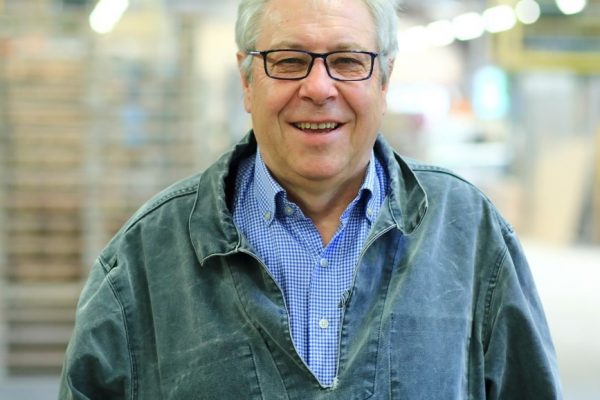
Are you interested in the Philippe de Woot Award?
The next edition will take place in March 2026 in Louvain-la-Neuve.
Any graduate student from a university or business school with a Master’s degree whose dissertation deals with CSR or sustainable development defended during the academic years 2023-2024 & 2024-2025 can apply for this award.
Partners
Academic partners

Corporate partners & contributors
